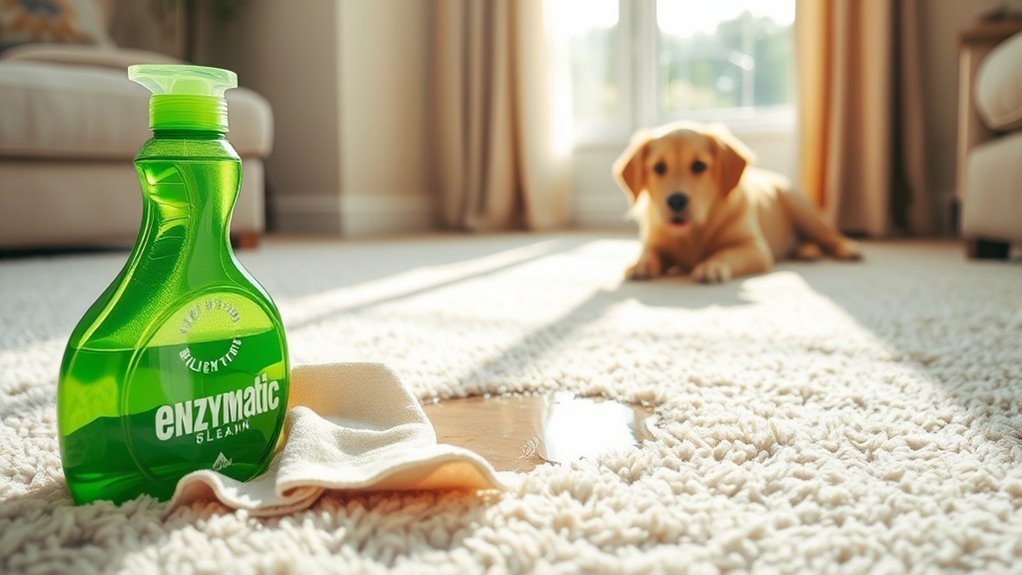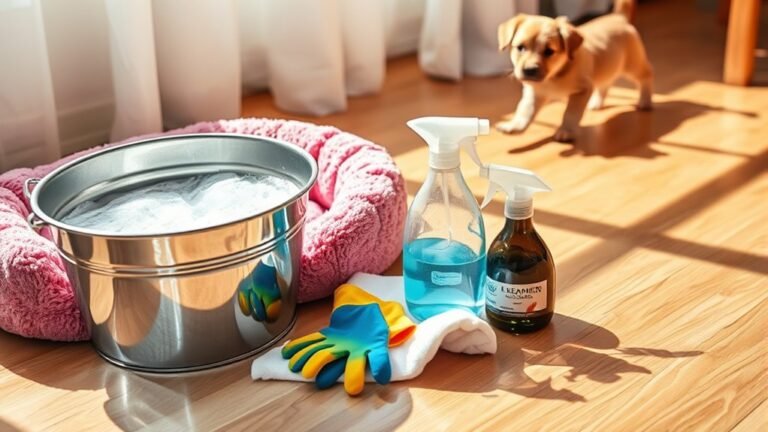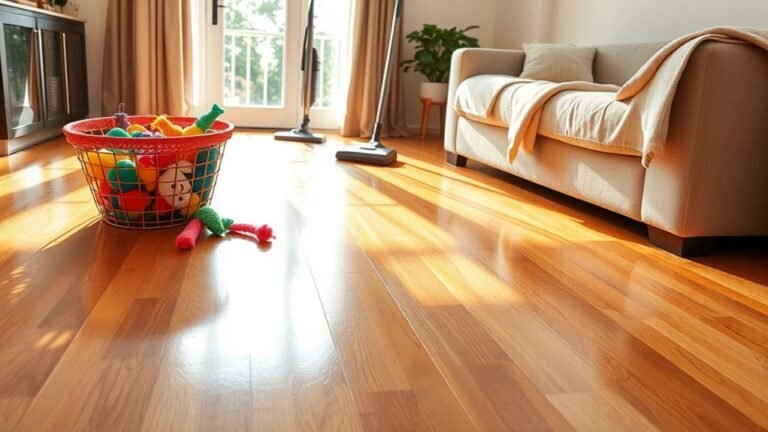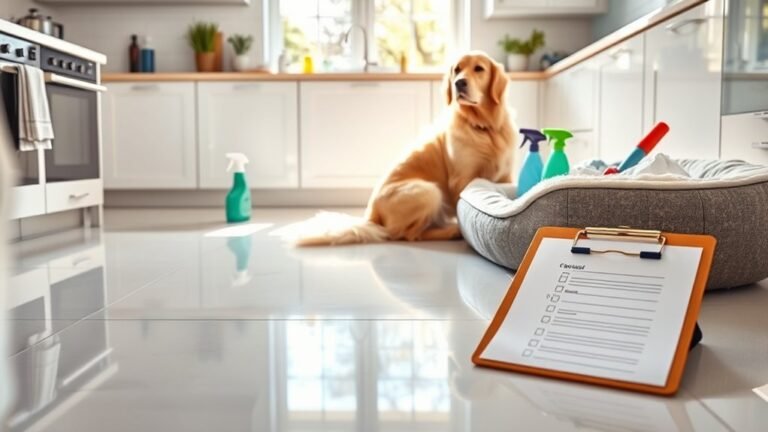Dealing With Pet Urine Stains and Odors
If you’re dealing with pet urine stains and odors, start by locating the exact spots using a UV light to find all hidden marks. Blot fresh stains immediately with cold water—don’t rub—to prevent deeper damage. Use enzyme cleaners or a vinegar and baking soda mix to fully eliminate odors. Protect your floors with sealants and consistent pet training to prevent future accidents. Keep going to discover the best methods for deep cleaning and lasting odor control.
Identifying the Source and Extent of Pet Urine Damage
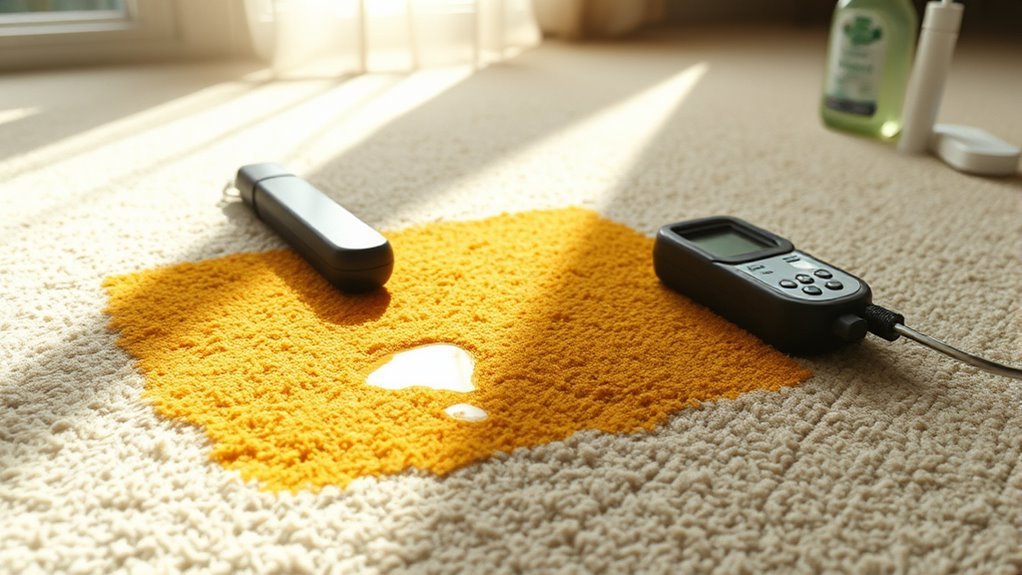
Before you can effectively clean pet urine stains and odors, you need to pinpoint exactly where the damage is and how severe it is. Urine detection is your first step—spotting hidden spots that might be invisible to the naked eye. You can use ultraviolet light or specialized urine detection sprays to reveal these stubborn stains. Once you’ve found the affected areas, conduct a thorough damage assessment. Check how deep the urine has soaked into carpets, floors, or furniture because this will determine how aggressive your cleaning approach needs to be. Taking control of this process empowers you to tackle the problem without guesswork, giving you the freedom to restore your space confidently and efficiently. Knowing the exact location and extent of damage saves time and prevents lingering odors.
Immediate Steps to Clean Fresh Urine Stains
Once you’ve identified where the urine has landed, acting quickly is key to preventing stains and odors from setting in. For fresh stain removal, start by blotting the area with paper towels—don’t rub, or you’ll spread it. Then, use cold water to dilute the urine and blot again. These quick cleaning tips help preserve your freedom from lingering smells.
| Step | Action | Why It Matters |
|---|---|---|
| 1 | Blot immediately | Absorbs urine, limits spread |
| 2 | Use cold water | Dilutes urine, eases cleaning |
| 3 | Avoid rubbing | Prevents deeper stain |
| 4 | Blot again | Removes leftover moisture |
| 5 | Air dry | Stops odor buildup |
Stay swift and steady—freedom from stains is just a few steps away.
Effective Products and DIY Solutions for Deep Cleaning
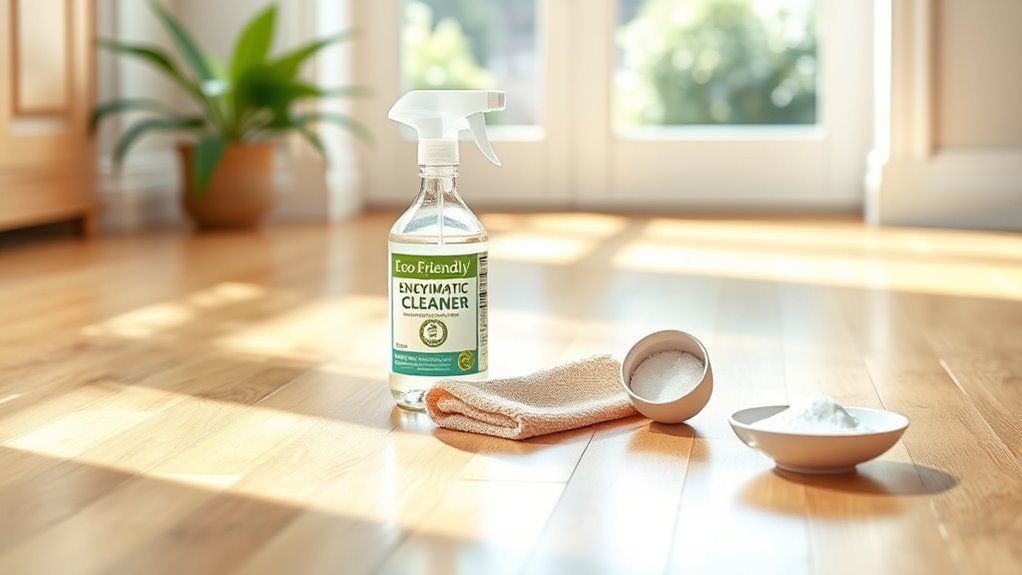
Although quick action helps, some urine stains require deeper cleaning to fully eliminate odors and discoloration. You’ll want to use enzyme cleaners, which break down urine molecules, tackling both stains and smells at the source. If you prefer natural remedies, a mix of white vinegar and baking soda can work wonders, neutralizing odors and lifting stains without harsh chemicals.
Here are your go-to options for deep cleaning:
- Enzyme cleaners designed specifically for pet urine
- A homemade solution of white vinegar followed by baking soda
- Hydrogen peroxide combined with a small amount of dish soap for tough spots
With these, you reclaim your space’s freshness and freedom without letting stains linger or odors hold you back.
Preventing Future Accidents and Protecting Your Floors
Cleaning up existing stains is a great start, but preventing new accidents is just as important to keep your floors in good shape. To truly enjoy your space without worry, you need practical urine prevention tips. Start by training your pet consistently and providing easy access to outdoor areas. Use waterproof mats or rugs in high-risk zones to add a layer of flooring protection. Consider sealants designed for your floor type—they help block liquids and odors from penetrating the surface. Regularly cleaning with enzyme-based products can also discourage repeat accidents. By combining these strategies, you’re not just reacting to messes but proactively safeguarding your home. This way, you maintain freedom in your space, knowing your floors are protected and future accidents minimized.
Managing Persistent Odors and Long-Term Maintenance
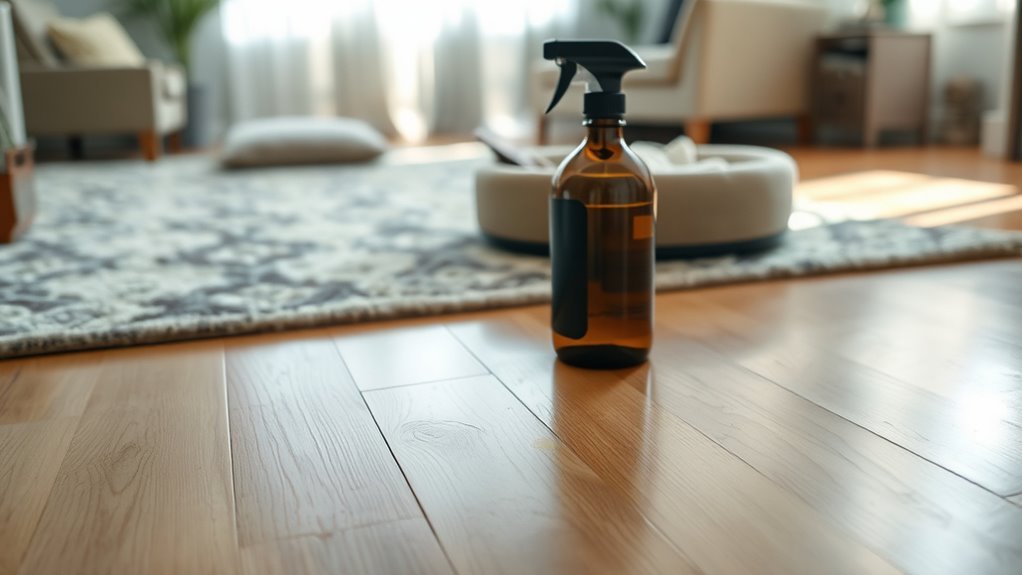
If you’ve dealt with pet urine stains before, you know that odors can linger long after the mess is gone. Managing persistent odors requires more than just quick cleanups; it demands consistent attention and effective odor neutralization techniques. To maintain your space’s freshness and enjoy long term carpet care, consider these steps:
- Use enzymatic cleaners regularly to break down urine molecules that cause smells.
- Ventilate rooms thoroughly to help disperse trapped odors and improve air quality.
- Schedule routine deep cleanings to remove embedded residues that simpler methods miss.
Taking control of stubborn odors guarantees your home stays inviting and free, letting you enjoy your space without worries. By committing to these practices, you’re safeguarding your floors and preserving the freedom to live comfortably alongside your pets.
Frequently Asked Questions
Can Certain Pet Diets Reduce Urine Odor?
Yes, certain pet diets can reduce urine odor by influencing urine pH and diet ingredients. When you choose foods that balance urine pH, it helps prevent strong odors caused by acidic or alkaline urine. Ingredients like controlled protein levels and added fibers can also make a difference. So, if you want your pet’s urine to smell fresher, picking the right diet tailored to their needs is a smart move that gives you more freedom from unpleasant smells.
How Does Pet Urine Affect Indoor Air Quality?
Did you know that indoor air can be up to five times more polluted than outdoor air? When pet urine evaporates, it releases ammonia and other indoor pollutants, which can seriously impact your home’s air quality. You might not notice it right away, but these airborne irritants can make breathing uncomfortable and limit your freedom to enjoy fresh, clean air indoors. Tackling urine evaporation helps you reclaim a healthier space to live freely.
Are There Professional Services for Urine Stain Removal?
Yes, you can find professional services that specialize in urine odor and stain removal. These experts use advanced treatments to completely eliminate odors and stubborn stains, freeing your space from persistent pet messes. By choosing professionals, you won’t have to worry about ineffective DIY methods or harsh chemicals. They handle the problem thoroughly, giving you back the fresh, clean environment you want without hassle or stress.
Can Enzyme Cleaners Be Harmful to Pets?
Enzyme efficacy earns your attention when ensuring enzyme safety for pet health. You’ll find most enzyme cleaners are formulated to be safe and non-toxic, so they won’t harm your furry friends when used correctly. However, you shouldn’t let pets lick or ingest the cleaner directly. Always follow label instructions and keep the area ventilated. By doing so, you maintain a healthy home without compromising your pet’s well-being or your freedom to clean effectively.
What Are Signs of Urinary Health Issues in Pets?
If you notice early warning signs like frequent urination, accidents outside the litter box, or blood in your pet’s urine, don’t ignore them. Behavioral changes such as increased licking of the genital area, restlessness, or signs of pain when peeing can also signal urinary health issues. Paying attention to these cues helps you act quickly, ensuring your pet stays free from discomfort and maintains their happy, healthy lifestyle.
